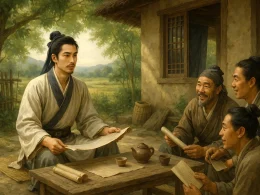A gallant man from northlands grim,
We meet where heroes’ lights burn dim.
Our hearts hold more than words can share—
The sun now dips. The road waits there.
Original Poem
「逢侠者」
钱起
燕赵悲歌士,相逢剧孟家。
寸心言不尽,前路日将斜。
Interpretation
This poem was composed by Qian Qi as a farewell piece upon encountering a wandering swordsman during his travels. Tang Dynasty literati often traveled extensively and formed diverse connections, with interactions between scholars and swordsmen being relatively common. This poem serves as a genuine portrayal of the poet's brief yet profound encounter with a chivalrous figure. Though devoid of grand scenes, its implications run deep—expressing both admiration for the swordsman and melancholy at parting.
First Couplet: "燕赵悲歌士,相逢剧孟家。"
Yān Zhào bēi gē shì, xiāng féng Jù Mèng jiā.
You are a knight-errant from Yan-Zhao, skilled in solemn songs,
We met by chance in Luoyang, home of Ju Meng the renowned.
The opening line elevates the swordsman's stature by referencing "Yan-Zhao"—a region famed for producing heroic figures—while "Ju Meng's home" alludes to Luoyang as the meeting place through classical典故 (allusion). This convergence of a chivalrous land and a chivalrous man highlights their shared spirit.
Second Couplet: "寸心言不尽,前路日将斜。"
Cùn xīn yán bù jìn, qián lù rì jiāng xié.
My heart holds endless words left unspoken,
Yet the sun declines—our paths must now be broken.
The second couplet encapsulates parting sorrow within fleeting time. "Endless words unspoken" conveys inexpressible sentiments, while "the sun declines" symbolizes both separation and an uncertain future, subtly expressing concern for the swordsman's fate and reluctant farewell.
Holistic Appreciation
This remarkably concise farewell poem condenses within four lines the image of a chivalrous figure, the circumstances of their encounter, their intellectual rapport, and the sorrow of parting. The poet employs two historical allusions—"the heroic ballads of Yan and Zhao" and the legendary swordsman Ju Meng—to deftly capture his friend's gallant character, while using restrained language to convey heartfelt admiration and regret.
Particularly poignant are the closing lines: "Words cannot exhaust what's in my heart,/As the sun declines on your forward path." These not only elevate the emotion of parting to its climax but also leave ample room for interpretation. They may suggest the poet's inability to fully express himself due to differing social status with the swordsman, or perhaps lament life's arduous journey and the fragility of friendship. This understated style conveys profound yet ineffable sincerity.
Artistic Merits
The poem's language is exceptionally economical, with naturally parallel structure progressing layer by layer—from character portrayal to meeting context, then emotional exchange, culminating in parting sentiment. Its classical allusions are apt, its emotion subtly genuine, demonstrating Qian Qi's signature style of refreshing elegance and restrained depth. As critic Gao Zhongwu noted: "Novel in form, lucid in thought," the poem exemplifies how minimal brushstrokes can express maximal feeling.
Insights
This compact farewell teaches us that genuine connection lies not in verbosity but in spiritual resonance and momentary sparks of understanding. Though life's road stretches uncertainly ahead, even a brief encounter, when rooted in authenticity, can become an enduring memory. By distilling this truth into four lines, the poet moves us profoundly—and reminds us to cherish those rare souls who truly resonate with our own.
About the Poet
Qian Qi (钱起, c. 722-780), a native of Huzhou, Zhejiang, was the foremost of the "Ten Talents of the Dali Era" in mid-Tang poetry. His poetic style, inheriting Wang Wei's legacy, excelled particularly in regulated verse (五律), characterized by its ethereal elegance. Yan Yu praised his work as "innovative in form," reflecting the Dali period's transition from the High Tang's naturalism to refined craftsmanship.











